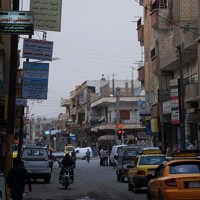RAQQA, Syria -- This dusty, nondescript provincial capital in eastern Syria has all the hallmarks of a city recently captured by rebel forces. A statue of former President Hafez Assad has been pulled down from its plinth, its lips painted red and a pair of horns fixed to its head. Nearby, houses have been reduced to rubble by government air raids, while many that remain standing are pockmarked by small-arms and heavy-weapons fire.
One feature, however, sets Raqqa apart from other towns captured by Syria’s rebels: The Syrian rebellion’s traditional flag -- green, white and black with three red stars, representing the moderate views of the original rebel movement -- is nowhere to be seen. Instead, a black flag bearing a verse from the Quran flies over Raqqa’s main square -- a flag often associated with Sunni Islamist extremists. Of the many gunmen patrolling the streets, most wear black ski masks, the headgear of choice for the Islamist militias that have become the dominant force in Syria’s two-year revolt to oust President Bashar Assad.
Raqqa is the first provincial capital to be fully controlled by rebel groups, all of them Islamist: Ahrar al-Sham, a Salafist group active mainly in northwestern Syria; Jabhat al-Wahda al-Tahrir al-Islamiya, a collection of local militias; and Jabhat al-Nusra, or the Nusra Front, which was branded as a terrorist group by the State Department and recently declared its allegiance to al-Qaida.

